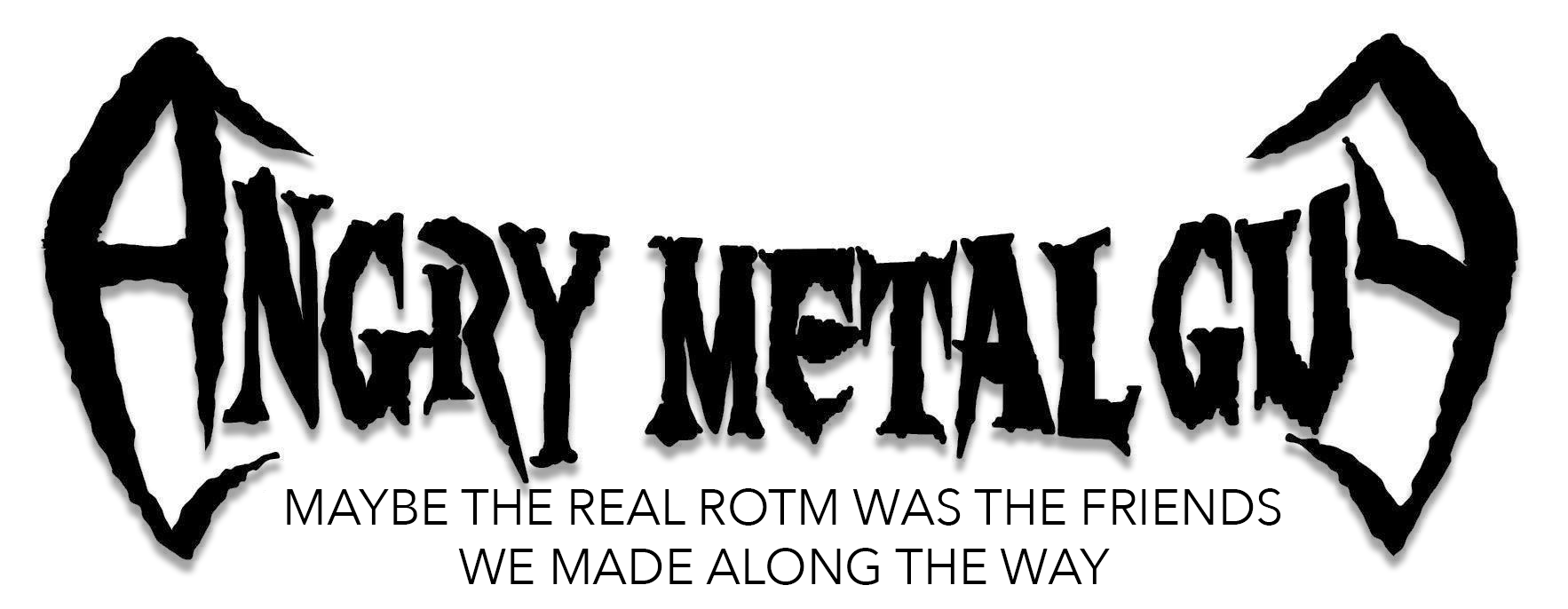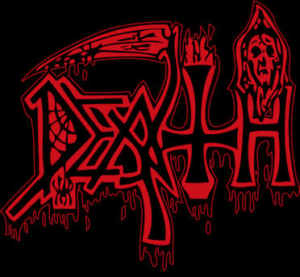 The life of the unpaid, overworked metal reviewer is not an easy one. The reviewing collective at AMG lurches from one new release to the next, errors and n00bs strewn in our wake. But what if, once in a while, the collective paused to take stock and consider the discography of one of those bands that shaped many a taste? What if three aspects of the AMG collective personality shared with the slathering masses their personal rankings of that discography and what if the rest of the personality used a Google sheet some kind of dark magic to produce an official and all-round definitive aggregated ranking of that band’s entire discography? Well, if that happened, we imagine it would like something like this …
The life of the unpaid, overworked metal reviewer is not an easy one. The reviewing collective at AMG lurches from one new release to the next, errors and n00bs strewn in our wake. But what if, once in a while, the collective paused to take stock and consider the discography of one of those bands that shaped many a taste? What if three aspects of the AMG collective personality shared with the slathering masses their personal rankings of that discography and what if the rest of the personality used a Google sheet some kind of dark magic to produce an official and all-round definitive aggregated ranking of that band’s entire discography? Well, if that happened, we imagine it would like something like this …
Seminal. Brvtal. Uncompromising. Tumultuous. Genre-defining. All terms that can, and should, be applied to US death metal titans, Death. Arguably the founders of death metal as we know it today, the band began life as Mantas, a name they abandoned in 1984 in favor of their – let’s be honest – infinitely cooler moniker, Death. They also sport what must be one of the longest lineup lists out there. No two records in Death’s discography have the same line-up and yet the quality – if not the style – is so incredibly consistent across all seven albums. When that seminal debut, Scream Bloody Gore, tore 1987 a new one, everything bar the drums1 was handled by Death mainman, genius and visionary Chuck Schuldiner, who was just 20 at the time. As Ferrous Beuller has pointed out, although the lyrical content of Gore may have revealed Schuldiner’s youth, the music spoke of great maturity on what was arguably2 the first true death metal record.3
 Over the course of six more albums, with Schuldiner the only constant, Death refused to stand still. By third album Spiritual Healing (1990), it was clear that Schuldiner was already looking to move Death beyond the genre he himself had defined just three years earlier, and by final album, The Sound of Perseverance, the band had moved wholeheartedly into progressive death metal territory. After this, Schuldiner put Death on ice to pursue his Control Denied project. He was never to return. Diagnosed with a brain tumor in 1999, at the age of just 32, he died two years later. His tragically early death deprived extreme music of a virtuoso talent – and that is to say nothing of his loss on a personal level, to his family and loved ones – but in Death, he left behind him an incredible legacy, one which feels as vital and relevant to metal fans today as it did more than thirty years ago, when Scream Bloody Gore began eviscerating ear drums.
Over the course of six more albums, with Schuldiner the only constant, Death refused to stand still. By third album Spiritual Healing (1990), it was clear that Schuldiner was already looking to move Death beyond the genre he himself had defined just three years earlier, and by final album, The Sound of Perseverance, the band had moved wholeheartedly into progressive death metal territory. After this, Schuldiner put Death on ice to pursue his Control Denied project. He was never to return. Diagnosed with a brain tumor in 1999, at the age of just 32, he died two years later. His tragically early death deprived extreme music of a virtuoso talent – and that is to say nothing of his loss on a personal level, to his family and loved ones – but in Death, he left behind him an incredible legacy, one which feels as vital and relevant to metal fans today as it did more than thirty years ago, when Scream Bloody Gore began eviscerating ear drums.
– Carcharodon
Carcharodon
As an avowed death metal sceptic, you may think that I am one of the writers least likely to be here writing about Death. And perhaps it is unlikely but from the moment I discovered Death – sadly only after Schuldiner’s passing – I was blown away. From the unrelenting aural lobotomy that Scream Bloody Gore and Leprosy performed on me, through the journey the band went on to arrive at progressive experimentation of The Sound of Perseverance, Death’s discography is pretty much peerless. The three constants across all seven albums are crushing heaviness, the incredible songwriting and musicianship, and Schuldiner’s consistent drive to grow and evolve. This ambition and this restless relentlessness led to seven albums, each with its own unique identity but each also utterly and uniquely Death.
The Ranking:
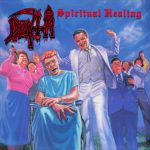 #7: Spiritual Healing (1990) – let’s be clear: there is no bad record in Death’s discography but, for me, Spiritual is the least good of a very strong bunch. It signaled a change of direction for Death after the out and out brutality of their first two albums, but is a precursor to the incredible progressive technicality that was to come. Still better than 90% of the death metal I’ve encountered, it feels like the transitional record that it is.
#7: Spiritual Healing (1990) – let’s be clear: there is no bad record in Death’s discography but, for me, Spiritual is the least good of a very strong bunch. It signaled a change of direction for Death after the out and out brutality of their first two albums, but is a precursor to the incredible progressive technicality that was to come. Still better than 90% of the death metal I’ve encountered, it feels like the transitional record that it is.
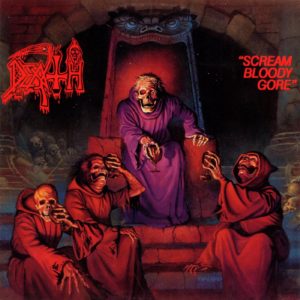 #6: Scream Bloody Gore (1987) – combining brvtality with technicality to basically found a genre in just 37 minutes is no small achievement and Gore does it with a swagger and ease that cannot be underestimated. Held back slightly by its lyrics, there is still no doubt that this is the sound of a “lobotomized corpse shredding your flesh” and that, in case you’re wondering, is a damned good thing.
#6: Scream Bloody Gore (1987) – combining brvtality with technicality to basically found a genre in just 37 minutes is no small achievement and Gore does it with a swagger and ease that cannot be underestimated. Held back slightly by its lyrics, there is still no doubt that this is the sound of a “lobotomized corpse shredding your flesh” and that, in case you’re wondering, is a damned good thing.
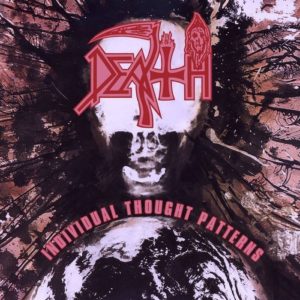 #5: Individual Thought Patterns (1993) – it might be a surprise to see this album so far down my list but it just doesn’t click with me in the same way as some of the others. It lacks the all-out, caustic ferocity of the first two Death records, while the progressive notes don’t quite hit the same, practically perfect heights of the last two. It’s complexity sees it just edge out Gore though and the one-two punch of the title track and “Destiny” is absolutely killer!
#5: Individual Thought Patterns (1993) – it might be a surprise to see this album so far down my list but it just doesn’t click with me in the same way as some of the others. It lacks the all-out, caustic ferocity of the first two Death records, while the progressive notes don’t quite hit the same, practically perfect heights of the last two. It’s complexity sees it just edge out Gore though and the one-two punch of the title track and “Destiny” is absolutely killer!
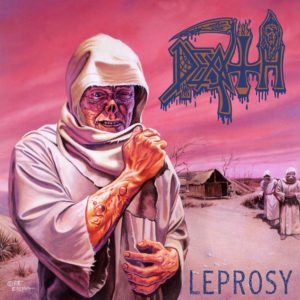 #4: Leprosy (1988) – the massive, ponderous riff that opens the title track and, with it, the album, immediately lets you know Death have dialed the heaviness up to 11 from their debut, while being unafraid to also take their foot off the pedal and slow things down at times. Leprosy feels slightly more balanced than Gore and more vicious and direct than Individual Thought Patterns. It also builds in an incredible groove to the likes of “Forgotten Past.”
#4: Leprosy (1988) – the massive, ponderous riff that opens the title track and, with it, the album, immediately lets you know Death have dialed the heaviness up to 11 from their debut, while being unafraid to also take their foot off the pedal and slow things down at times. Leprosy feels slightly more balanced than Gore and more vicious and direct than Individual Thought Patterns. It also builds in an incredible groove to the likes of “Forgotten Past.”
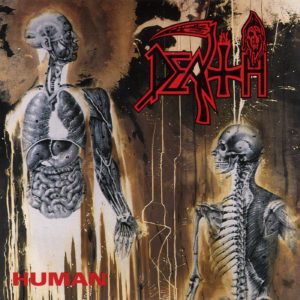 #3: Human (1991) – from the moment the ominous, metronomic drumming of “Flattening of Emotions” begins, you know Human is going to be something special and not one of its 34 minutes disappoints. Relentlessly aggressive, at times beautifully melodic (“Secret Face”) and playfully experimental (“Cosmic Sea”), Human is an incredibly captivating ride, which you step off breathless.
#3: Human (1991) – from the moment the ominous, metronomic drumming of “Flattening of Emotions” begins, you know Human is going to be something special and not one of its 34 minutes disappoints. Relentlessly aggressive, at times beautifully melodic (“Secret Face”) and playfully experimental (“Cosmic Sea”), Human is an incredibly captivating ride, which you step off breathless.
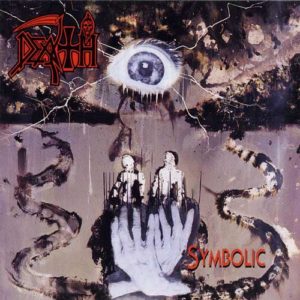 #2: Symbolic (1995) – widely (and probably rightly) considered to be Death’s crowning achievement, Symbolic draws together the threads of, and perfects, everything that was Death to that point. Ferocious, almost thrash-inspired riffs? Check (“Symbolic” and “Misanthrope”). Bass-led groove and melodic leads? Check (“Empty Words”). Gorgeous progressive solos? (“Sacred Serenity”). It is also perfect in terms of the pacing, taking you by the hand – in a crushing grip – and leading you to where Schuldiner wants you to be. It is one of a very small handful of records that if I were reviewing now, I would unhesitatingly stamp with the mighty 5.0. Symbolic is simply Iconic.
#2: Symbolic (1995) – widely (and probably rightly) considered to be Death’s crowning achievement, Symbolic draws together the threads of, and perfects, everything that was Death to that point. Ferocious, almost thrash-inspired riffs? Check (“Symbolic” and “Misanthrope”). Bass-led groove and melodic leads? Check (“Empty Words”). Gorgeous progressive solos? (“Sacred Serenity”). It is also perfect in terms of the pacing, taking you by the hand – in a crushing grip – and leading you to where Schuldiner wants you to be. It is one of a very small handful of records that if I were reviewing now, I would unhesitatingly stamp with the mighty 5.0. Symbolic is simply Iconic.
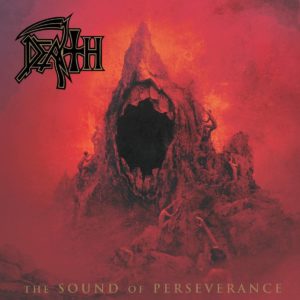 #1: The Sound of Perseverance (1998) – so why isn’t Symbolic at the top of this list? It’s an entirely personal, likely heretical, choice but I just love, and connect with, Perseverance more on an emotional level. It feels like the perfect culmination to the journey Death began on Spiritual Healing and it was also the first Death album I heard, winning it a special place with me. When that incredible drumming and lightning guitar solo open “Scavenger of Human Sorrow,” it’s like a gut punch that keeps going until the stunning “Painkiller” cover that closes it. The perfectly-named instrumental “Voice of the Soul” is simply gorgeous, while the visceral “Flesh and the Power it Holds” and pummeling “Bite the Pain,” in particular, find Schuldiner on the best, throat-shredding vocal form of his career. In my head, I know it’s not the best technically but I still had no hesitation in putting it top.
#1: The Sound of Perseverance (1998) – so why isn’t Symbolic at the top of this list? It’s an entirely personal, likely heretical, choice but I just love, and connect with, Perseverance more on an emotional level. It feels like the perfect culmination to the journey Death began on Spiritual Healing and it was also the first Death album I heard, winning it a special place with me. When that incredible drumming and lightning guitar solo open “Scavenger of Human Sorrow,” it’s like a gut punch that keeps going until the stunning “Painkiller” cover that closes it. The perfectly-named instrumental “Voice of the Soul” is simply gorgeous, while the visceral “Flesh and the Power it Holds” and pummeling “Bite the Pain,” in particular, find Schuldiner on the best, throat-shredding vocal form of his career. In my head, I know it’s not the best technically but I still had no hesitation in putting it top.
Ferrous Beuller
Death is not the end; it’s only the beginning. Every patron of this site should already know how immeasurable Chuck Schuldiner’s contributions to extreme music were. His forward thinking provided a template that not only informs death metal to this day, but also set the direction for the genre’s evolution. For a man so musically obsessed with the ultimate end, his musical legacy has achieved immortality. Death remains the pestilent king of the bone pile and recruits new devotees with each generation. My own discovery of the band changed my inclinations dramatically and had an immediate impact on my current taste. Now, allow me to quantify the order in which you should enjoy the discography, because that’s kind of what we do around here. Death, deliverance for you for sure – now there’s nothing you can do…
The Ranking
 #7: Scream Bloody Gore – As far as debuts go, it doesn’t get much better than one that ignites an entire genre. Although it flickers into last place here, it only does so because the nascence that affords it such charm feels increasingly apparent. I simply don’t listen to Scream Bloody Gore as much as the others. However, I fucking love this album, which should place these listings in the appropriate context.
#7: Scream Bloody Gore – As far as debuts go, it doesn’t get much better than one that ignites an entire genre. Although it flickers into last place here, it only does so because the nascence that affords it such charm feels increasingly apparent. I simply don’t listen to Scream Bloody Gore as much as the others. However, I fucking love this album, which should place these listings in the appropriate context.
 #6: The Sound of Perseverance – Death’s final album follows hot on the heels of their debut and for all the opposite reasons. I love how rich and developed this record is. But, while the writing is exceptional, the overt melody and Chuck’s screeching vocals sometimes leave some delectable death to be desired. A exceptional record; I simply prefer more beast with my beauty.
#6: The Sound of Perseverance – Death’s final album follows hot on the heels of their debut and for all the opposite reasons. I love how rich and developed this record is. But, while the writing is exceptional, the overt melody and Chuck’s screeching vocals sometimes leave some delectable death to be desired. A exceptional record; I simply prefer more beast with my beauty.
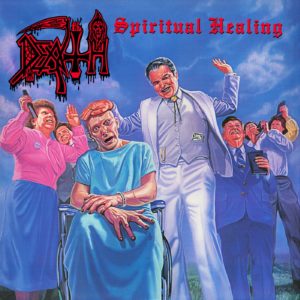 #5: Spiritual Healing – Every tenured band has one album that suffers from bookend syndrome. One that exists between two titanic records. The riffs on Spiritual Healing are huge and Chuck’s social conscience was in full swing. But the fact remains, this album is destined to mark the transition between two of the most famous death metal albums in history. And it lives in their shadow.
#5: Spiritual Healing – Every tenured band has one album that suffers from bookend syndrome. One that exists between two titanic records. The riffs on Spiritual Healing are huge and Chuck’s social conscience was in full swing. But the fact remains, this album is destined to mark the transition between two of the most famous death metal albums in history. And it lives in their shadow.
 #4: Individual Thought Patterns – Chuck’s progressive leanings were now on full display. Although I don’t love the mix on this record, the instrumentation can’t be questioned. The album suffers the same fate as Spiritual Healing in it’s placement, but it never fails to tempt me back with its incredible songs and razor sharp soloing. The diamond allure of Andy LaRocque doesn’t hurt either…
#4: Individual Thought Patterns – Chuck’s progressive leanings were now on full display. Although I don’t love the mix on this record, the instrumentation can’t be questioned. The album suffers the same fate as Spiritual Healing in it’s placement, but it never fails to tempt me back with its incredible songs and razor sharp soloing. The diamond allure of Andy LaRocque doesn’t hurt either…
 #3: Leprosy – What a fucking brute. Primitive yet designed to last, this is one of the most influential albums ever. Leprosy bludgeons with brutality but boasts just enough nuance to ensure the songs sear the flesh upon first listen. Where would death metal be without “Pull the Plug” or “Open Casket?” If you’re a younger fan and wonder just where that OSDM sound comes from, then listen no further. I’ll rot along with this record until the gory end.
#3: Leprosy – What a fucking brute. Primitive yet designed to last, this is one of the most influential albums ever. Leprosy bludgeons with brutality but boasts just enough nuance to ensure the songs sear the flesh upon first listen. Where would death metal be without “Pull the Plug” or “Open Casket?” If you’re a younger fan and wonder just where that OSDM sound comes from, then listen no further. I’ll rot along with this record until the gory end.
 #2: Human – This album has a unique appeal. Not only is it innately progressive, but it maintains Death’s capacity to crush. The songs all harbor a malevolent streak to dwarf oceans but they’re equally concerned with expansion. All tech and progressive death albums owe Human a musical debt. The bones of Leprosy still protrude through the skin while the growth of works to come insistently layers the violence. The album’s ability to provide cuts as diverse as “Secret Face” and “Vacant Planets” with such cogency is what keeps me coming back.
#2: Human – This album has a unique appeal. Not only is it innately progressive, but it maintains Death’s capacity to crush. The songs all harbor a malevolent streak to dwarf oceans but they’re equally concerned with expansion. All tech and progressive death albums owe Human a musical debt. The bones of Leprosy still protrude through the skin while the growth of works to come insistently layers the violence. The album’s ability to provide cuts as diverse as “Secret Face” and “Vacant Planets” with such cogency is what keeps me coming back.
 #1: Symbolic – There are few bands whose growth can be as clearly charted as Death’s. Symbolic is the apex of a creative journey that began in earnest with Spiritual Healing. By this point, Chuck’s musical vision had been refined into a psionic hook that was employed with extreme prejudice in every track. The album’s cohesion is such that “Perennial Quest” is an oddly emotional closer. This absolutely wouldn’t be the case if the preceding tracks didn’t consistently beguile with some of the most considered writing in extreme metal. Symbolic’s pacing, immersion and sheer quality place it at the very peak of what may be a perfect discography.
#1: Symbolic – There are few bands whose growth can be as clearly charted as Death’s. Symbolic is the apex of a creative journey that began in earnest with Spiritual Healing. By this point, Chuck’s musical vision had been refined into a psionic hook that was employed with extreme prejudice in every track. The album’s cohesion is such that “Perennial Quest” is an oddly emotional closer. This absolutely wouldn’t be the case if the preceding tracks didn’t consistently beguile with some of the most considered writing in extreme metal. Symbolic’s pacing, immersion and sheer quality place it at the very peak of what may be a perfect discography.
L. Saunders
The legacy of Chuck Schuldiner and Death speaks for itself. When I was in the midst of delving into the depths of extreme metal in the early ‘00s, it was the death metal genre that appealed to me the most within the wide array of extreme styles, and remains my favorite metal genre to this day. Death was a pivotal part of my explorations. Symbolic was my first Death experience, opening a door to my endearing love for the band and the amazing evolution, raw power, innovation and individuality of each their seven albums. Disclaimer: rankings and personal preferences aside, every Death album is fucking essential and not to be ignored. The thing that speaks for itself about Death, is often album preferences and rankings wildly differ from person to person. My own rankings have shifted over the years, a testament to the different shades and overall strength and quality of Chuck’s body of work.
The Ranking
 #7: Scream Bloody Gore – While it may sit at the bottom of the pile, Scream Bloody Gore remains a vital debut and one of the finest early examples of the genre. The raw, hacksawing riffs, catchy songwriting, and blood-soaked atmosphere still sounds fresh to this day. Far from just a relic in time, Scream Bloody Gore marked a formidable beginning of a remarkable career trajectory.
#7: Scream Bloody Gore – While it may sit at the bottom of the pile, Scream Bloody Gore remains a vital debut and one of the finest early examples of the genre. The raw, hacksawing riffs, catchy songwriting, and blood-soaked atmosphere still sounds fresh to this day. Far from just a relic in time, Scream Bloody Gore marked a formidable beginning of a remarkable career trajectory.
 #6: Spiritual Healing – An underrated but more than worthy album in the Death repertoire, Spiritual Healing marked a key transitional moment in Death’s career. Bridging the gnarled charms and brutality of the first couple of albums, with the ever-improving musicianship and sophistication that would manifest itself in the progressive and technical realms of subsequent Death albums. Not always an immediate go-to, but a great album nonetheless.
#6: Spiritual Healing – An underrated but more than worthy album in the Death repertoire, Spiritual Healing marked a key transitional moment in Death’s career. Bridging the gnarled charms and brutality of the first couple of albums, with the ever-improving musicianship and sophistication that would manifest itself in the progressive and technical realms of subsequent Death albums. Not always an immediate go-to, but a great album nonetheless.
 #5: Human – Death’s monumental fourth LP is rightfully regarded as a landmark album of technical and progressive death metal. Chuck continued to tinker with his revolving line-up to match his lofty ambitions and increasingly intricate musicianship and song arrangements. The addition of Cynic members, Sean Reinert (drums) and Paul Masvidal (guitars), along with insanely talented bassist Steve Di Giorgio, resulted in a timeless piece of art. Complex, melodic, brutal and memorable, Human may have slipped down my personal ranks, but remains a remarkable accomplishment and timeless classic that still garners high rotation.
#5: Human – Death’s monumental fourth LP is rightfully regarded as a landmark album of technical and progressive death metal. Chuck continued to tinker with his revolving line-up to match his lofty ambitions and increasingly intricate musicianship and song arrangements. The addition of Cynic members, Sean Reinert (drums) and Paul Masvidal (guitars), along with insanely talented bassist Steve Di Giorgio, resulted in a timeless piece of art. Complex, melodic, brutal and memorable, Human may have slipped down my personal ranks, but remains a remarkable accomplishment and timeless classic that still garners high rotation.
 #4: The Sound of Perseverance – Death’s swansong is something of an odd duck in the band’s catalog. Although it contains all the ingredients of past Death albums, leaning heavily into the technical and progressive nature of their later material, it also contains a very unique and individual vibe that has always stood out to me. Yes, there’s an argument it is a little frontloaded and indulgent, but the highs are exceptional and the standard largely consistent from front to back. Meanwhile, Chuck’s vocals are as vital as ever, bringing an almost blackened acidity into his trademark emotive howls and snarls. A hugely talented yet underrated line-up, including the powerhouse drumming of Richard Christy, and a clean, punchy production seal the deal. “Bite the Pain,” “Spirit Crusher” and “A Moment of Clarity” highlight a special album.
#4: The Sound of Perseverance – Death’s swansong is something of an odd duck in the band’s catalog. Although it contains all the ingredients of past Death albums, leaning heavily into the technical and progressive nature of their later material, it also contains a very unique and individual vibe that has always stood out to me. Yes, there’s an argument it is a little frontloaded and indulgent, but the highs are exceptional and the standard largely consistent from front to back. Meanwhile, Chuck’s vocals are as vital as ever, bringing an almost blackened acidity into his trademark emotive howls and snarls. A hugely talented yet underrated line-up, including the powerhouse drumming of Richard Christy, and a clean, punchy production seal the deal. “Bite the Pain,” “Spirit Crusher” and “A Moment of Clarity” highlight a special album.
 #3: Leprosy – Although I tend to gravitate towards Death’s more complex, technical works, Leprosy’s addictive songcraft, bevy of classic riffs, and timeless anthems, such as “Forgotten Past,” “Pull the Plug,” and epic closer “Choke on It,” always finds the album in high rotation when I’m in the mood for Death. Schuldiner’s ever developing compositional, instrumental and vocal skills continued to push the envelope, while the pummeling drum work of Bill Andrews, and wild, unchained flair of guitarist Rick Rozz upped the ante. Retaining the ragged edges and brutality of the debut, Leprosy is a stunning advancement in song-writing, composition, and musicianship. The songs are incredibly catchy, dynamic and uncompromising in heaviness, capturing a keen balance of increased refinement without sacrificing the ugly, ragged edges and brutal chops of the debut.
#3: Leprosy – Although I tend to gravitate towards Death’s more complex, technical works, Leprosy’s addictive songcraft, bevy of classic riffs, and timeless anthems, such as “Forgotten Past,” “Pull the Plug,” and epic closer “Choke on It,” always finds the album in high rotation when I’m in the mood for Death. Schuldiner’s ever developing compositional, instrumental and vocal skills continued to push the envelope, while the pummeling drum work of Bill Andrews, and wild, unchained flair of guitarist Rick Rozz upped the ante. Retaining the ragged edges and brutality of the debut, Leprosy is a stunning advancement in song-writing, composition, and musicianship. The songs are incredibly catchy, dynamic and uncompromising in heaviness, capturing a keen balance of increased refinement without sacrificing the ugly, ragged edges and brutal chops of the debut.
 #2: Individual Thought Patterns – The dark horse of the Death canon, an album that often lurks in the shadow of its like-minded predecessor, Individual Thought Patterns has gradually rocketed up the rankings over the years to become one of my favorite Death albums. Featuring perhaps the most gifted of line-ups, with wildcard Andy LaRocque, and the incredible rhythm section of Steve Di Giorgio and Gene Hoglan, joining the inimitable Chuck. Dark, heavy, complex, groovy and featuring some truly mesmerizing and soulful guitar work, Individual Thought Patterns may require time and patience to unlock its full power, but beneath the knotty technicality and claustrophobic vibe is an album of staying power and deceptively catchy writing. Much like Kowalski’s unusual request for a meat on meat sandwich that agitated Ren, towering bookends “Overactive Imagination” and “The Philosopher” are prime slabs of beef, encasing the meaty delights that comprise the guts of the album.
#2: Individual Thought Patterns – The dark horse of the Death canon, an album that often lurks in the shadow of its like-minded predecessor, Individual Thought Patterns has gradually rocketed up the rankings over the years to become one of my favorite Death albums. Featuring perhaps the most gifted of line-ups, with wildcard Andy LaRocque, and the incredible rhythm section of Steve Di Giorgio and Gene Hoglan, joining the inimitable Chuck. Dark, heavy, complex, groovy and featuring some truly mesmerizing and soulful guitar work, Individual Thought Patterns may require time and patience to unlock its full power, but beneath the knotty technicality and claustrophobic vibe is an album of staying power and deceptively catchy writing. Much like Kowalski’s unusual request for a meat on meat sandwich that agitated Ren, towering bookends “Overactive Imagination” and “The Philosopher” are prime slabs of beef, encasing the meaty delights that comprise the guts of the album.
 #1: Symbolic – Far from just being a sentimental favorite, Symbolic is the gold standard for Death albums and remains one of the genre’s finest ever releases. All that is great about Death is embedded into a singular, monumental whole on Symbolic. The virtuoso musical talents on display would count for little if not attached to compelling, fluid arrangements, penetrating hooks, and the heaviness, soul and raw emotion bleeding from every pristine note and stunning solo. The opening title track is worth the price of admission alone, reinforced with other stupendous cuts like, “Zero Tolerance,” “Crystal Mountain,” and cutthroat chugger, “Misanthrope.” Frankly though, they are all winners, throughout an album containing wall to wall killer tunes. Featuring excellent production and some of the finest guitar work of Death’s career, courtesy of the eloquence and riff churning skills of Schuldiner, and hugely impressive performance from the little-known Bobby Koelble. The stars truly aligned for this masterpiece.4
#1: Symbolic – Far from just being a sentimental favorite, Symbolic is the gold standard for Death albums and remains one of the genre’s finest ever releases. All that is great about Death is embedded into a singular, monumental whole on Symbolic. The virtuoso musical talents on display would count for little if not attached to compelling, fluid arrangements, penetrating hooks, and the heaviness, soul and raw emotion bleeding from every pristine note and stunning solo. The opening title track is worth the price of admission alone, reinforced with other stupendous cuts like, “Zero Tolerance,” “Crystal Mountain,” and cutthroat chugger, “Misanthrope.” Frankly though, they are all winners, throughout an album containing wall to wall killer tunes. Featuring excellent production and some of the finest guitar work of Death’s career, courtesy of the eloquence and riff churning skills of Schuldiner, and hugely impressive performance from the little-known Bobby Koelble. The stars truly aligned for this masterpiece.4
Official AMG Ranking
The writers’ votes have been cast, counted, several fiddled and a number discounted due to their wrongness or the writer’s overrating habits, and it has produced this, The Official AMG Ranking for Death:
#7: Scream Bloody Gore (1987), with 20 points out of a possible 705
#6: Spiritual Healing (1990), with 23/70
#5: Individual Thought Patterns (1993), with 39/70
#4: Leprosy (1988), with 42/70
#3: Human (1991), with 43/70
#2: The Sound of Perseverance (1998), with 45/70
#1: Symbolic (1995), with 68/70
If you don’t know Death, leave the Hall but, on your way out, make sure to check out this primer, picked by Carcharodon, Ferrous Beuller and L.Saunders.
